Reviews
David Lynch
USA/Italy, 1984
Credits
Review by Leo Goldsmith
Posted on 12 June 2013
Source Universal DVD
Categories Failed Franchises
“The beginning is a very delicate time.” So says Virginia Madsen, or Princess Irulan, or the floating head thereof, fading in and out at curious intervals against a backdrop of deep space at the outset of Dune.
And she’s not wrong: the beginning is especially delicate when attempting to adapt to the screen the first novel of Frank Herbert’s sprawling science-fiction epic which, by 1984, had burgeoned into a multigenerational saga five dense novels deep. Herbert would publish one more novel before his death the following year - his son would extend the series still further in both directions - but the series up to that point had already covered roughly 5,000 years of history, comprising an intricate system of intergalactic feudalism, resource-extraction, and occult breeding practices.
So idiosyncratic a director as David Lynch, who had by then made only Eraserhead and the acclaimed Elephant Man, may now seem like an odd choice to spearhead such an adaptation. And yet, Herbert’s series is itself an idiosyncratic franchise, an unlikely but distinctive amalgamation that, in many ways, tested and redefined the generic horizons of science fiction as a whole. It’s a series that, despite a couple of more recent televisual attempts, has long defied an adequate translation to the screen. Indeed, it’s flouted the efforts of more than one idiosyncratic auteur: Alejandro Jodorowsky famously attempted a large-scale adaptation in the 1970s (along with the help of Moebius, Pink Floyd, Orson Welles, and Salvador Dalí), but somehow couldn’t manage it. (Interestingly, Jodorowsky and Moebius were later able to channel some of this vision into their graphic novel work.) Given this track-record, it’s a wonder that anyone at all, let alone Lynch, was able to complete even so overstuffed a version as this.
To be sure, Lynch’s Dune has its defenders and its detractors, but one fairly overwhelming opinion - shared by the director himself - is that it’s not really a David Lynch film. And yet, I’ve always felt it necessary to defend Dune—not because it’s a great film, and certainly not because it’s a great David Lynch film, but in fact precisely because it’s neither. Imperfect films by great directors always offer fascinating insights into their makers’ processes or intentions, and Dune is by every measure an intriguing example. Amid all the recent critical chatter about what some like to call “vulgar auteurism” - which, as Nick Pinkerton has recently pointed out, is really just “auteurism” - I find it rather more instructive to look at those works which puncture the sanctity of a pervasive fixation on the single author, a notion which surely counters all but the most fanciful notions of what it takes to get a movie made.
Dune was written and directed by David Lynch, and should thus be regarded alongside all his other works, regardless of whether it coheres with the David Lynch auteur brand as he and others wish to define it. And so, we’re faced with a curious, but perhaps appropriate blend of strategies and motivations - “plans within plans,” as Herbert’s characters might put it - a fascinating and often ambivalent system of ideas and impetuses, literary, cinematic, financial, and interpersonal.
If Dune is a David Lynch film and a Frank Herbert adaptation, it’s also distinctly a product of the De Laurentiis empire, and thus is cannily situated amid a mid-1980s industrial standard of franchise-building, international casting, and exorbitant production costs. Say what one will about the film’s icy moods and impenetrable situational complexity - both, one might add, features of Herbert’s original novels - the film is clearly designed to exhibit every penny of its budget on screen, from the riot of sculptural and architectural minutiae, rendered in baroque detail, sickly greens, and opulent golds, and endlessly impressive credits. Creature creator Carlo Rambaldi, who had started his career making gross things for Mario Bava, and would go on to design E.T., here contributes a number of strange beasts, including the famed sand-worms of Arakis and the slug-like, yonic-mouthed Spacing Guild Navigators, mutated humanoids who, in Lynch’s version, float through a vast chamber high on the spice Melange and “fold space.” And surely no film that draws upon the musical talents of both Toto and Brian Eno can be all bad, though the score is better when it’s less trumpet-and-snare and more ambient synthesizer.
Nor could it be said to be a total loss for Lynch, who collaborates here for the first time with some fairly conspicuous figures, including Twin Peaks regulars Kyle MacLachlan (foppish and cherubic as the young Paul Atreides) and Everett McGill (terse and crusty as the stolid Fremen leader Stilgar), as well as Brad Dourif, Dean Stockwell, and Alicia Witt. (Longtime pals Jack Nance, Alan Splet, and Frederick Elmes also drew a paycheck on the project.) Even if the De Laurentiis house style demanded a degree of euro-pudding casting (including some slumming by the likes of Silvia Mangano, Max von Sydow, and Jürgen Prochnow), there’s a fair number of British stage actors (Francesca Annis, Patrick Stewart) to infuse the awesomely stilted dialogue with its requisite gravitas. And I haven’t even mentioned a greased-up and mostly naked Sting.
It’s easy to get bogged down in the similarities and differences between Lynch’s film and Herbert’s original, but the film is, if nothing else, a measurable feat of condensation. What’s most interesting about Herbert’s universe - and what Lynch clearly gets, albeit in his own weirding way - is the notion of a long-gestating history of human consciousness, one that has evolved past the age of “Thinking Machines” (that is, artificial intelligence), through to an age of advanced human cognition and prescience on a cosmic scale. This makes for quite an odd entry in Lynch’s body of work, which tends to deal with more local folklore and narrower universes. But he is adept at pivoting between the singular, slightly naïve hero, like Eraserhead’s Henry or Blue Velvet’s Jeffrey, and a multiplicity of distinctly eccentric minor players.
While MacLachlan, in his debut performance, does an exceptional job here - first appearing with amazing hair, American Boy affect, and a pet pug on his lap, before morphing (“The sleeper must awaken!”) into the clear-eyed god figure of the planet Dune - it’s really the bizarre array of minor characters that stands out: the “Mentat” Thufir Hawat, played by Freddie Jones, with giant eyebrows and a mouth stained with spice-juice that look like herpes; Sian Phillips’s wicked witch-like Bene Gesserit reverend mother, who wields control over nearly everyone; and, most of all, the relentlessly evil Baron Harkonnen, played by Kenneth McMillan as a repulsive, obese, gay sadist, a blimp-like Frank Booth with oozing face pustules and ruddy hair. (In the mid-1980s, it was tough to ignore the uncomfortable proximity of this characterization to the stereotype of an AIDS-infected homosexual predator, as film scholar Robin Wood noted.)
Certain stylistic choices are more faithful to Herbert’s series than others, but then fidelity is not always a virtue. The inner voices that Herbert uses throughout the novels, which serve as a crucial index of layers of complex and competing intentionality and lend an eerily omniscient perspective to the narrative, are rendered in Lynch’s film in the rather more conventional hushed voiceover. This makes more sense for some characters (say, Paul and his musings on his destiny) than for others (say, Baron Harkonnen driving home the point once again that he is going to give Duke Leto an unpleasant demise). Lynch is far more adept at interweaving Paul’s many flashbacks, dreams, and premonitions in purely visual form, an echo of his work on Elephant Man, though something he would be less matter-of-factly Freudian about in future.
But even in paring the novel down somewhat, a surprising amount of detail is retained, and Herbert’s notorious narrative and political intricacy, a byzantine armature of internecine intrigue and feudalistic skullduggery, comes across rather clearly (albeit at the price of a leadenly expositional first act). Despite the evident influence of Herbert’s work on George Lucas’s own astro-franchise, the result is rather closer in tone to a Jacobean revenge play than to a Campbellian, universalist astro-myth (or, in the later films, intergalactic C-SPAN broadcast). Not that De Laurentiis didn’t also try to sell toys and soundtracks, or commission sequels. But Lynch, at least, seems to have approached the project with something like sincere intentions, and a curious appreciation for a story that advocates the millennia-long gestation of an omnipotent Christ figure, the mass transformation of consciousness, and the grand orchestration of histories and genealogies through seemingly minor gestures and assertions of will.
Of course, this condensation does eventually become ridiculous, particularly by the film’s climax, which neatly summarizes a few important plot-points and nifty scenes in order to give on a large-scale battle sequence, which is all laser-beams and worm-carnage. Such genre staples all but single-handedly transport Dune into the mold of Big-Budget Sci-Fi Franchise—familiar territory for Dino, but a less intimate space for Lynch. But if this experience with bloated brand-building was the push Lynch needed to force him retreat to the little suburb of Lumberton, then it was a useful exercise indeed. The sleeper must awaken.
More Failed Franchises
-
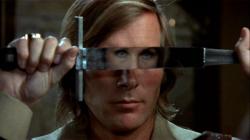
Captain Kronos - Vampire Hunter
1974 -
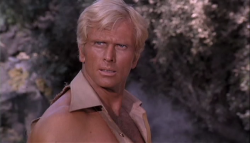
Doc Savage: Man of Bronze
1975 -
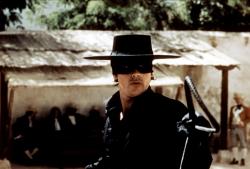
Zorro
1975 -
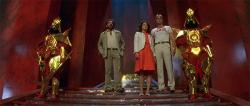
Flash Gordon
1980 -
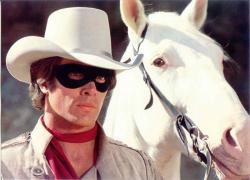
The Legend of the Lone Ranger
1981 -
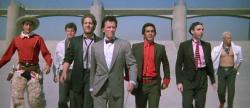
The Adventures of Buckaroo Banzai Across the 8th Dimension!
1984 -
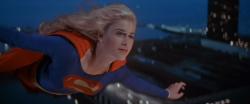
Supergirl
1984 -

Dune
1984 -
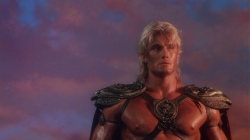
Masters of the Universe
1987 -

Howard the Duck
1986 -

Willow
1988 -

Dick Tracy
1990 -

The Rocketeer
1991 -

V.I. Warshawski
1991 -
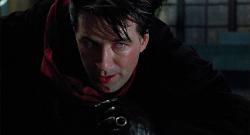
The Shadow
1994 -

Godzilla
1998 -
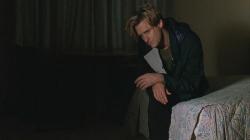
The Zero Effect
1998 -

The Mod Squad
1999 -

Hulk
2003 -

Master and Commander: The Far Side of the World
2003 -
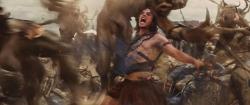
John Carter
2012
We don’t do comments anymore, but you may contact us here or find us on Twitter or Facebook.



